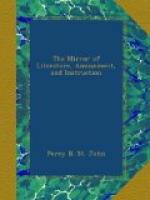THE MIRROR OF LITERATURE, AMUSEMENT, AND INSTRUCTION.
Vol. 20, No. 568.] Saturday, September 29, 1832. [Price 2d.
* * * * *
[Illustration: Birthplace of the earl of Eldon.]
Little need be said, by way of explanation, for the addition of the present subject to our collection of the birthplaces of eminent men. It is something to know that John Scott was born at Newcastle-upon-Tyne, in the principal dwelling represented in the above Engraving, in the year 1751; that he received the rudiments of his education at the free grammar-school of the town; that he grew up “a man of safe discretion;” that he enjoyed the highest legal honours which his sovereign could bestow for a quarter of a century; and that he still lives, a venerable octogenarian, in the enjoyment of “glory from his conscience, and honour from men.” The biography of so distinguished an individual must have innumerable good tendencies: it at once inculcates the wholesome truth that “every man is the architect of his own fortune;” and it presents us, moreover, with the encouraging picture of a well-regulated life, and its healthful energies so employed in the discharge of important duties as to entitle the subject to high rank among the worthies of his country.
John Scott, Lord Eldon, is the third son of William Scott, of Newcastle-upon-Tyne. “His father was by trade what in the language of the place is called a ‘fitter,’ or agent for the sale and shipment of coals. He had by industry and habits of close saving accumulated rather considerable means from small beginnings. Beyond this he was a man of great shrewdness and knowledge of the world,” and quickly perceiving the talents of the two younger boys, William (now Lord Stowell,) and John, he wisely gave them an education in accordance with their mental endowments. “It is said that the singular variety in the talent of these two remarkable youths was manifested at a very early age. When asked to ‘give an account of the sermon,’ which was a constant Sabbath custom of their father, William, the eldest, gave at once a condensed and lucid digest of the general argument. John, on the other hand, would go into all the minutiae, but failed in producing the lucid, general view embodied in half the number of words by his brother."[1] The two boys received their early education at the free grammar-school of Newcastle.[2] William was from the beginning destined for the study of the law. John was at first intended for the church, and was, accordingly, sent to Oxford: early marriage was, however, the fortunate means of changing his destination, and he began the world in the same profession with his brother. In 1757, John was entered as a student at the Middle Temple, and was called to the bar at the usual period. He at this time possessed an extensive stock of legal




